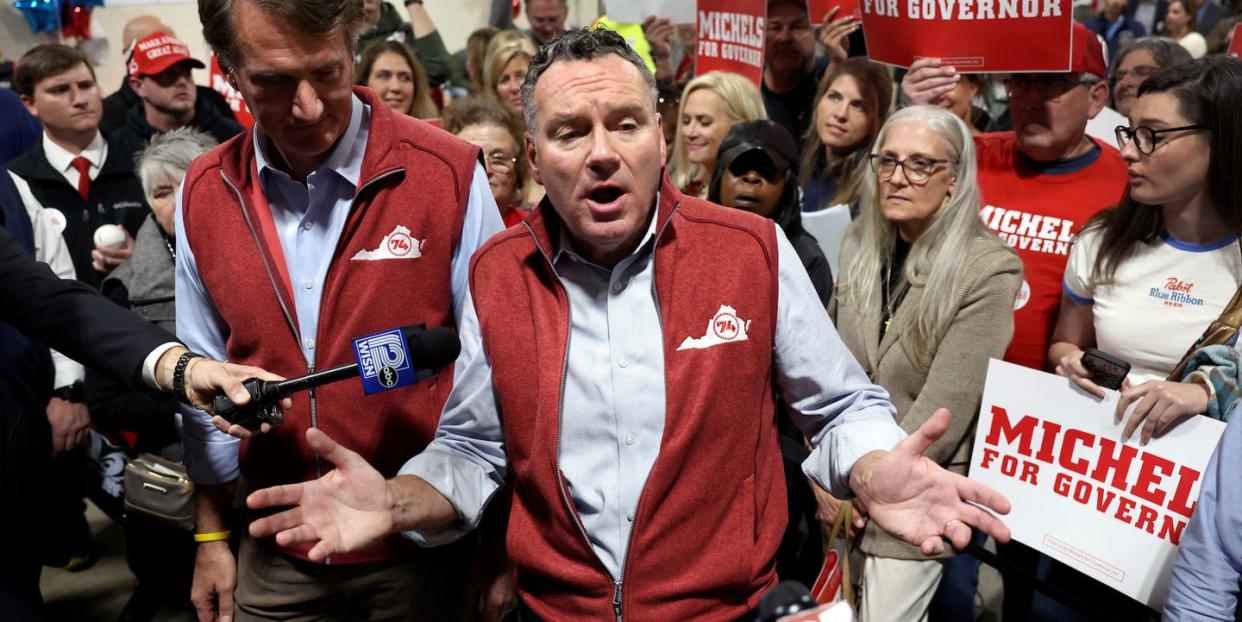Wisconsin Republicans Humbly Suggest They Should Win Every Election, Regardless of How People Vote

- Oops!Something went wrong.Please try again later.
- Oops!Something went wrong.Please try again later.
For years, Wisconsin has been ground zero for extreme partisan gerrymandering. This is often cast as unfair to Democrats, who are locked out of running the state legislature no matter how many more votes they get. But it is better understood as an assault on the constitutional rights of the American citizens who live in Wisconsin, including independents who don't particularly like the Democrats at all. The state is a true 50-50 battleground, except that if Republicans get around half the vote, they're in striking distance of a supermajority in the legislature. Republicans in the statehouse have drawn their own districts to give themselves control of the state regardless of election outcomes. Their maps are "voter-proof." This is scarcely about Democrats at all, except insofar as their incompetence and/or naïveté throughout the Obama era allowed Republicans to begin these machinations in earnest back in 2010.
Article IV, Section 4 of the United States Constitution provides that "the United States shall guarantee to every State in this Union a Republican Form of Government," but Wisconsin is on the precipice of becoming something other than a republican form of government. Perhaps it's already there. In 2018, Ari Berman reports, Republicans lost all five statewide races, won 47% of the votes cast for the state assembly, and kept 64% of the assembly seats. Not content with that, though, it seems they're angling to finish the job of ensuring the Republican Party wields power regardless of how voters vote. Just look at what Tim Michels, the Republican candidate for governor, had to say on Tuesday, one week out from Election Day: "Republicans will never lose another election in Wisconsin after I'm elected governor."
Is he suggesting that they'll implement such amazing policies that make Wisconsinites' lives so much better that they'd never dream of voting for anyone else ever again? That's what his spokesman told the Washington Post after. That would be some tax cut!
Personally, I'm willing to consider the possibility that it has something to do with the sprawling campaign among Wisconsin Republicans to change the state's election laws and seize control of the elections infrastructure. They are not coy about this. Since the 2020 election, the (again, completely unrepresentative) legislature has passed a steady stream of election reform bills that Democratic Gov. Tony Evers has readily vetoed. Michels, who seeks to unseat him, would sign any and all of them, considering he has suggested the 2020 election was not legitimate. (He wouldn't even say he won't go back and try to decertify the results! In 2023!) Michels has also pledged to restructure the state’s bipartisan elections commission, which was created by Republicans in 2016.

Even if Michels loses—meaning Republicans have a mediocre performance statewide—they could still secure a supermajority if things break their way and go to work on all of this while overriding a re-elected Evers's veto. They could mess around with elections infrastructure in time for next year's supreme court election, and if they can keep control of the court they could have their future behavior rubber-stamped. After all, the current court already chose the legislature's almost incredibly gerrymandered map as the one that would be used for this year's elections. In this way, Wisconsin is proof positive that the Republican assault on representative government began long before Donald Trump came on the scene, harnessing gerrymandering and the courts to insulate their agenda—and their control of the levers of power—from public opinion. In any book on the steady decay of democratic life in America, Mitch McConnell deserves his own chapter as much as Trump does.
Still, it's hard to dispute that Trump has made things a whole lot worse. Michels is just one Republican gubernatorial candidate who lives in the fantasyland where Trump really won an election in which he got 7 million fewer citizens' votes. The candidates to run Arizona (Kari Lake), Pennsylvania (Doug Mastriano), and Michigan (Tudor Dixon) have all said the 2020 election was stolen from Trump based on the phantasmagorical explosions in their own heads. (The Republican secretary of state candidate in Arizona, who would have power over elections if elected, tweeted on Monday that "they" stole Pima, Maricopa, and Yuma counties "at a minimum" in 2020.) The more traditional methods of trying to cement your grip on power by twisting the institutions of democracy have been joined to an outright rhetorical assault on American elections. Soon, the assault could be far more than rhetorical.
And in the end, again, this is not some sad-sack story about how Democrats can't catch a break. They made their bed when they gave away the state legislatures in the Obama years. It is, however, the sad story of how American citizens are being disenfranchised by ambitious cowards who for their own gain would dispense with the basic principle that Americans get to choose their political leaders—and throw them out when they don't like the job they're doing. These individual Republican lawmakers are being elected by pools of voters they themselves built. Democratic voters are packed into districts where they'll elect some Democrats. But who are independents electing to the legislature? And if the public doesn't like the laws the legislature is passing, how can a majority of that public change who passes the laws?
The swing voters out there may throw the Democrats out based on prices at the pump and the supermarket, and that's understandable. But these folks might also consider that the people they'd be voting for want to remove the possibility that they could be thrown out for poor performance in the future. What happens if Wisconsinites decide they don't like Republican governance three years from now? They could be in a situation where there are elections, but nothing ever changes. When that happens in other countries, we call it "competitive authoritarianism."
You Might Also Like

